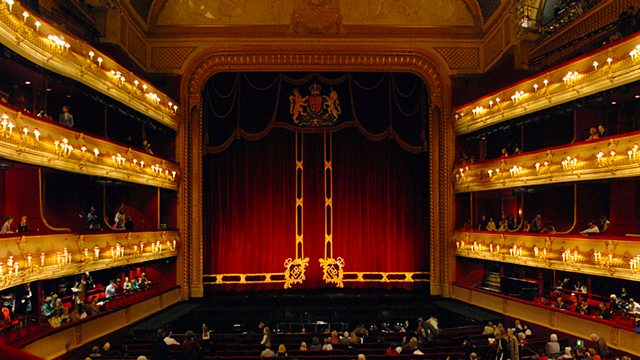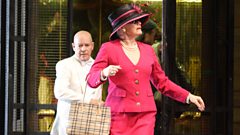
Richard Strauss: Ariadne auf Naxos
Another chance to hear Karita Mattila as Ariadne and Roberto Sacca as Bacchus in Strauss's opera. Antonio Pappano conducts the ROH Orchestra in Christof Loy's production.
Tonight’s Opera on 3 was originally scheduled to feature the soprano Karita Mattila in the planned ROH production in April of Janacek's Jenufa. That production was cancelled with the current closure of the Opera House but this repeat broadcast is an opportunity to hear Karita Mattila in another opera, Richard Strauss's Ariadne auf Naxos.
Karita Mattila stars as the prima donna who appears later as Ariadne and Roberto Sacca is the tenor, later Bacchus, in this often funny work which once again sets a libretto by Strauss's greatest collaborator, the librettist Hugo von Hoffmansthal. The work was originally intended as a short divertissement to be performed after Hoffmansthal's version of Moliere's Le Bourgeois Gentilhomme which itself had incidental music by Strauss. However, it soon became clear that in this version the work wouldn't be performed often due to the expense. So it was revised as an opera in a prologue and one act, albeit with a small orchestra and with another of Strauss's great soprano roles.
Presented by Ivan Hewitt, and was first broadcast in July 2014 as part of the Richard Strauss 150 celebration.
Ariadne / The Prima Donna ..... Karita Mattila (Soprano)
Bacchus / The Tenor ..... Roberto Sacca (Tenor)
Zerbinetta ..... Jane Archibald (Soprano)
The Composer ..... Ruxandra Donose (Mezzo-soprano)
Harlequin ..... Markus Werba (Baritone)
Music Master ..... Thomas Allen (Baritone)
Dancing Master ..... Ed Lyon (Tenor)
Wig Maker ..... Ashley Riches (Baritone)
Lackey ..... Jihoon Kim (Bass Baritone)
Scaramuccio ..... Wynne Evans (Tenor)
Brighella ..... Paul Schweinester (Tenor)
Truffaldino ..... Jeremy White (Bass)
Officer ..... David Butt Philip (Baritone)
Naiad ..... Sofia Fomina (Soprano)
Dryad ..... Karen Cargill (Mezzo-soprano)
Echo ..... Kiandra Howarth (Soprano)
Major Domo ..... Christopher Quest (Speaker)
Royal Opera House Orchestra
Antonio Pappano (Conductor)
Last on
More episodes
Previous
Clip
-
![]()
Strauss: Ariadne auf Naxos - Opera Guide
Duration: 09:31
Music Played
-
![]()
Richard Strauss
Ariadne auf Naxos
Singer: Karita Mattila. Orchestra: Orchestra of the Royal Opera House. Conductor: Sir Antonio Pappano. -
![]()
Hector Berlioz
Harold in Italy i) Harold aux montagne
Performer: Tabea Zimmermann. Orchestra: London Symphony Orchestra. Conductor: Colin Davis.- LSO LIVE.
Synopsis
Prologue
A gathering is taking place in the home of a patron of the arts. After a gala dinner, the guests are to attend the private premiere of the opera Ariadne auf Naxos, which the host has commissioned from a highly talented young composer. The Music Master – the Composer’s teacher – has heard that a comedy troupe will appear after the opera for the amusement of the guests. This is confirmed by the Major Domo, who adds that a firework display will close the festivities at nine o’clock sharp.
��
Gradually, the Ariadne company becomes aware that the comedy troupe, led by the singing dancer Zerbinetta, is also preparing to appear. The Prima Donna is outraged, and the Composer shaken by the ignorance of patrons who want a cheap entertainment after the dutiful fulfilment of the commission. With time running out before the start of the performance, the rivalry between two groups of artists intensifies. The Major Domo appears with his master’s last-minute instructions: the dance comedy will be performed neither as prologue nor as epilogue to the opera, but rather at the same time. The artists must keep strictly to the timetable so the fireworks can begin on the dot of nine.
��
The reaction is one of rage and bewilderment; the Composer is prepared to give it all up and leave immediately. Only when the Music Master reminds him how badly he needs the fee is he persuaded to stay. The Dancing Master, as impresario of the comedy troupe, steps in to mediate. He convinces the young musician that even the greatest composers of
the past had to make similar compromises, and persuades him to make the cuts that will leave room for the comedians and ensure the punctual start of the fireworks. Helplessly the Composer agrees.
��
Zerbinetta and her four partners are rapidly told the plot of the heroic opera, so that they can find a way to incorporate their improvisations into it. The ��Composer’s agitation grows as he listens to the caricatured explanation of a work that is sacred to him. In his opinion, the frivolous Zerbinetta is hardly suitable to appear in a drama about love and
fidelity. Offended, Zerbinetta fleetingly reveals the melancholic side of her character to the Composer, and there is a moment of profound empathy between the two.
Drawing new energy from his exchange with Zerbinetta, the Composer makes peace with his teacher, whose readiness to compromise he had hitherto found contemptible. He looks forward to the premiere of his work with courage and resolute belief in sacred music. Only when he witnesses a display of vulgar intimacy between Zerbinetta and Harlequin does his world fall apart again.
��
��
OPERA
After a relationship as short as it was intense, Princess Ariadne has been deserted by Theseus. Since then she has retired from the world, shutting herself off from human contact. She finds it impossible to leave Naxos, the setting of her last happy days with Theseus, and is determined to be eternally faithful to him. In her imagination she repeatedly re-creates her lost happiness, waking only to be confronted by her loneliness.
��
Naiad and Dryad, as well as the unfeeling Echo, are her companions and witness her suffering. A wandering troupe of actors – Zerbinetta, Scaramuccio, Brighella, Truffaldino and Harlequin – has ventured close to the Princess. They are astonished by her trance-like state and Harlequin sings to her about the importance of turning pain into new life. Ariadne doesn’t respond, however, preferring to glorify the realm of death. She is waiting for the god Hermes, who will free her from life and escort her to the land of shadows.
��
This denial of life is incomprehensible to the comedians, who use their levity to try to reinvigorate Ariadne, but she distances herself all the more. In a woman-to-woman conversation, Zerbinetta gives an account of the diversity of her numerous romantic liaisons. An admission emerges from her comforting words: although her principles dictate that she be faithful to her lovers she invariably fails. This is the power that men have over her, whether she likes it or not. Ariadne sees for herself how Zerbinetta allows herself to be wooed by her partners, when she finally falls into the arms of Harlequin, the one whom she had hitherto been able to resist.
��
Confused by what she has just heard and seen, Ariadne is now helped by Naiad and Dryad to prepare for the unexpected arrival of the god Bacchus. The girls do not, however, know if she has understood them, for when Bacchus finally stands before her,
Ariadne takes him for Hermes, who she believes will accompany her into the realm of the dead.
��
Bacchus has just torn himself from the embraces of the enchantress Circe, and, fascinated by Ariadne, struggles against the prospect of new romantic confusions. Ariadne, still mistaking him for the god of death, captivates him more and more. Although she expected a very different form of transformation, Ariadne no longer defends herself against the man who promises her life, not death. She bids farewell to her sorrows and follows Bacchus into new love.
��
Christof Loy
trans. Áine Sheil
Broadcasts
- Wed 16 Jul 2014 19:15�鶹������ҳ��� Radio 3
- Sat 25 Apr 2020 18:30�鶹������ҳ��� Radio 3
Featured in...
![]()
More music on Radio 3—Radio 3 in Concert
We broadcast more live and specially-recorded concerts and opera than any other station.




